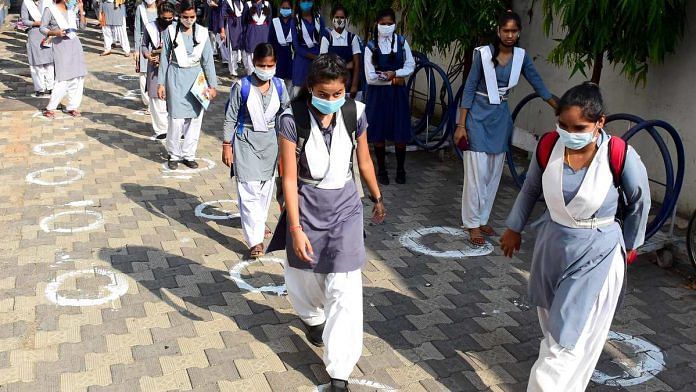New Delhi: Children who do not have access to facilities like smartphones, internet, TV and radio, will be taught through community methods including lessons relayed through loudspeakers, the Ministry of Human Resource Development has suggested in its guidelines for digital education released Tuesday.
As reported first by ThePrint, the guidelines are meant to make online education more organised, which includes limiting screen time for students.
The guidelines, prepared by National Council for Educational Research and Training (NCERT), list three modes of learning — online, partially online and offline.
Also read: Govt turns to ‘TV classrooms’ as online lessons prove to be a challenge during lockdown
Different categories of households
While designing the guidelines, experts have taken into consideration various categories of households — those with all facilities like laptop/computer/smartphone, TV and cable; those with a smartphone and 4G connection; those with smartphones but limited access to the internet; those with a TV and cable connection; those with a radio set and a basic mobile phone; and those with no digital devices.
Children in the last three kinds of households are the most disadvantaged when it comes to online learning, so the government has suggested offline mode, which includes the use of community methods. A number of teachers ThePrint had spoken to also agreed that they face a tough time reaching children with no access to internet or smartphones.
“In case a student does not have access to TV, community television, which is available in panchayat union office or in public places, can be used for mass education,” the guidelines state.
“In cases where radio is not available with the student, community radio, if available in panchayat union office or in public places, can also be utilised, along with loudspeakers for mass education in some generic areas,” they say.
Though imparting education through loudspeakers has only recently been suggested by the central government, there is a successful example from Jharkhand, where a teacher in Dumka district addressed the non-availability of smartphones in his village by putting up several loudspeakers in his village and relaying lessons from the school classroom.
Community radio and AIR
For imparting education through radio, the government runs programmes like Radio Vahini FM 91.2 MHz, which is the community radio station of the National Institute of Open Schooling.
The HRD Ministry has also been making efforts to impart more educational content through FM radio by collaborating with All India Radio (AIR). HRD Minister Ramesh Pokhriyal ‘Nishank’ had told ThePrint in an April interview in that the ministry is working on the possibility of relaying educational content through AIR. Some states like Haryana have already begun classes through AIR.
The HRD guidelines also state that if parents of a child are unable to support him/her with classes, then teachers should suggest alternative support like peer learning or seeking help from neighbours, identified local volunteers, etc.
Also read: Go online but don’t go overboard — how Karnataka panel wants govt to regulate classes



